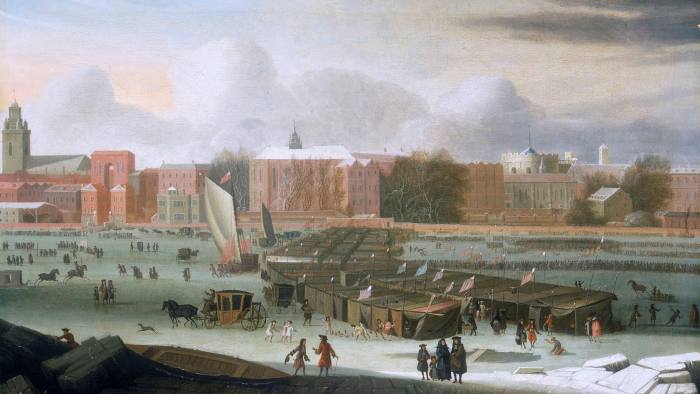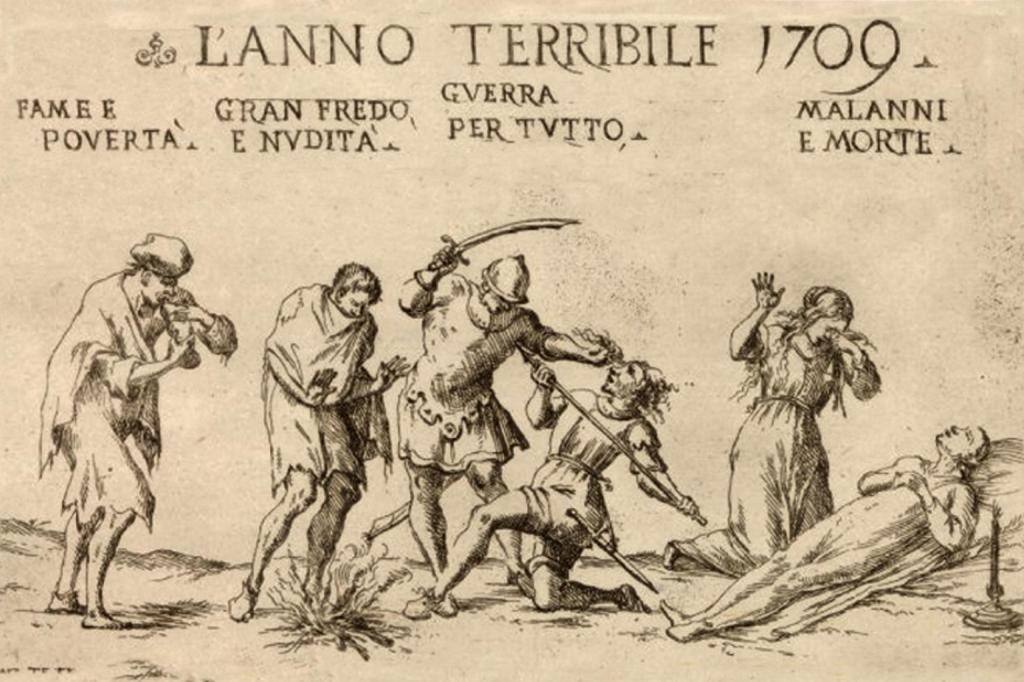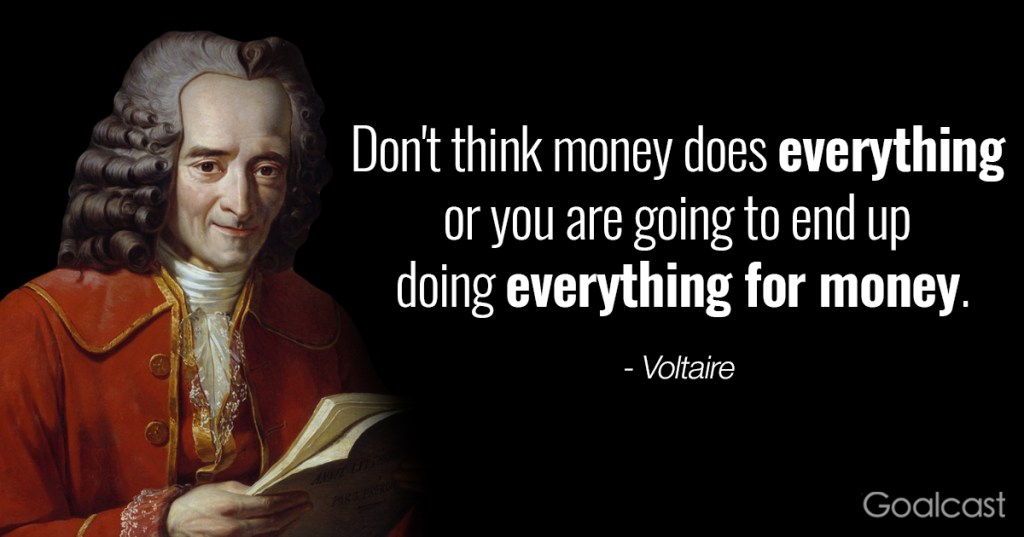
The Bank of England has warned that we are heading for the worst recession since 1709, when the Great Frost froze not just the Thames but economic activity across Europe. It was the coldest winter in the last 500 years, called Le Grand Hiver in France, where some 600,000 deaths in the following decade were attributed to the famine which followed. People ice-skated on the canals of Venice and rode horseback across the Baltic Sea. But the cold and resultant hunger led to a ‘flu epidemic across Europe and the spread of the plague from Turkey. Then, as now, the hardship and lethal illness fell disproportionately on the poor. The famous line “Let them eat cake” (actually brioche) – wrongly attributed to Marie Antionette, who was nine when Rousseau first recorded these words of a ‘great princess’ in his 1782 Confessions – have now been echoed by Prince Charles who, on behalf of under-staffed fellow land-owners, has suggested to the burgeoning unemployed “let them pick fruit”.

Even as we complacently clap many of them for their work in care homes and the NHS, while fruit and veg will rot for the shortage of their countrymen coming to work in the fields, this appalling government is passing through parliament the legislation that will stop essential European workers coming here to work in the future. At the same time, they have refused to scrap the £400 per capita annual surcharge for foreign workers and their families – due to rise to £624 in October – being levied on those who are working (and disproportionately dying) in hospitals for our benefit. They already pay UK tax and national insurance as we do, so it is, like the immigration bill, no more than an obscene obeisance to the xenophobic minority whose passions drove the Brexit vote and Johnson’s election victory. As the vile Home Secretary, not so Priti Patel, said to the nodding dogs who passed the first reading on Monday: “In line with ending free movement, there will be no immigration route for lower-skilled workers.” That’s a significant proportion, if not most, of Britain’s cleaners, field workers and delivery drivers – those we have belatedly come to realise are ‘key workers’. That appellation, I have realised, is something many working people have adopted with justifiable pride this past two months.
When confronted by the intellectual pygmies now in power, and the regressive policies they seem determined to foist upon us, even as the contrary evidence is over-bearing, a return to 1709 may not be so bad. As an historian, I have occasionally wished I was born in the 18th century, despite it being a period largely ignored in schools. This is partly because the period, defined by the French philosopher D’Alembert as “the century of philosophy par excellence”, culminated in the French Revolution and the subsequent Reign of Terror, and revolution frightens Brits just as much as the Commies did in the Cold War. But essentially, it gave us the Enlightenment, the flourishing of science and thought which broke the stranglehold of religion and gave rise to the industrial revolution. It was a throwing off of ties and deference. As Alexander Pope’s couplet in An Essay on Man (1733) goes: “Know then thyself, presume not God to scan/ The proper study of mankind is man”. Immanuel Kant in his “An Answer to the Question: What is Enlightenment?” (1784), describes it as humankind’s release from its self-incurred immaturity: “Immaturity is the inability to use one’s own understanding without the guidance of another.” This is not the blind inanity of “following the science”, but mastering the science, and encouraging others to interrogate it also. The Scots philosopher and essayist David Hume, who influenced Kant, was the ultimate sceptic, who deconstructed knowledge and reason to such an extent that he not only distrusted academics but wrote “Reason is, and ought only to be the slave of the passions” (A Treatise of Human Nature, 1739–40).

This is not, as our semi-literate Prime Minister might rush to adopt, an invitation to do and screw what you want, but an instruction to engage the full range of one’s intellectual capacities in getting to the truth. Imaginatively distorting comparative death tolls and promising the improbable were not on Hume’s mind. In a coruscating Guardian piece this week, Polly Toynbee hammers the government for its lies and half-truths. “Everything about this low-grade, callow crew makes them the most unfit government in living memory to cope with this great crisis…..They learn nothing from their errors, eroding any trust in the notion that their prime motive might be serving the public’s best interest, not saving their own skins. Boris Johnson looks an ever more inadequate figurehead for their floundering ship.” Yet we are stuck with them – and their determination to persist with the further damage of Brexit come what may – under Cameron’s ill-considered Fixed-term Parliaments Act 2011 for another four-and-a-half years. With the current 30-35% contraction in the economy, the Bank of England predict a 9 per cent rate of unemployment next year.
It remains to be seen what, if any, fresh shoots may emerge from the recession of 2020, but you may be surprised to find the Europeans of 1709 bounced back and that same year developed the first European porcelain (Meissen), the hot air balloon (Lisbon), the piano (Florence), the collapsible umbrella (Paris) and eau de Cologne.

In that time – to misappropriate Orson Welles’ Harry Lime in The Third Man – we didn’t even invent the cuckoo clock. That character was, of course, an immoral drug dealer in Vienna. If and when a vaccine for the corona virus is found, his kind will be in the ascendant, as supply shortages and ill-prepared privateers again step into the breech to profit from our mutual misery, as they did with PPE supplies. We must only hope that one of the British initiatives succeed, our having cleverly stepped away from evil European cooperation. And we can hardly look to Chloroquine Trump for succour if the Americans get there first. Following his attempts to dismantle the Obamacare access for all health reforms, there will undoubtedly be a heavy mark-up on the vaccine, making it inaccessible to the urban poor who need it most, with the riots predicted in the film Contagion to follow.
The spectre of social breakdown conjured by the toilet-roll panic buying at the beginning of the pandemic has yet to be realised on either side of the Atlantic, but the UK is not the acme of civilisation Voltaire found during his two-year exile here in 1726-8. The celebrated philosophe, who introduced the work of Shakespeare to France and whose work and intellect dominated the middle of the 18th century, would have been depressed by the quality of political life found here today. As he wrote, “common sense is not so common” and, maybe more presciently, “Those who can make you believe absurdities, can make you commit atrocities”. Voltaire died on May 30th, 1778, and the sheer range of his life’s work and influence reminds me of my central tenet, that history is not the onward and upward march of progress, as most fondly imagine, but cyclical at best. We may have the mobile phone, but we have been imprisoned and impoverished by the coronavirus. Right now, the 18th century doesn’t look all bad.

